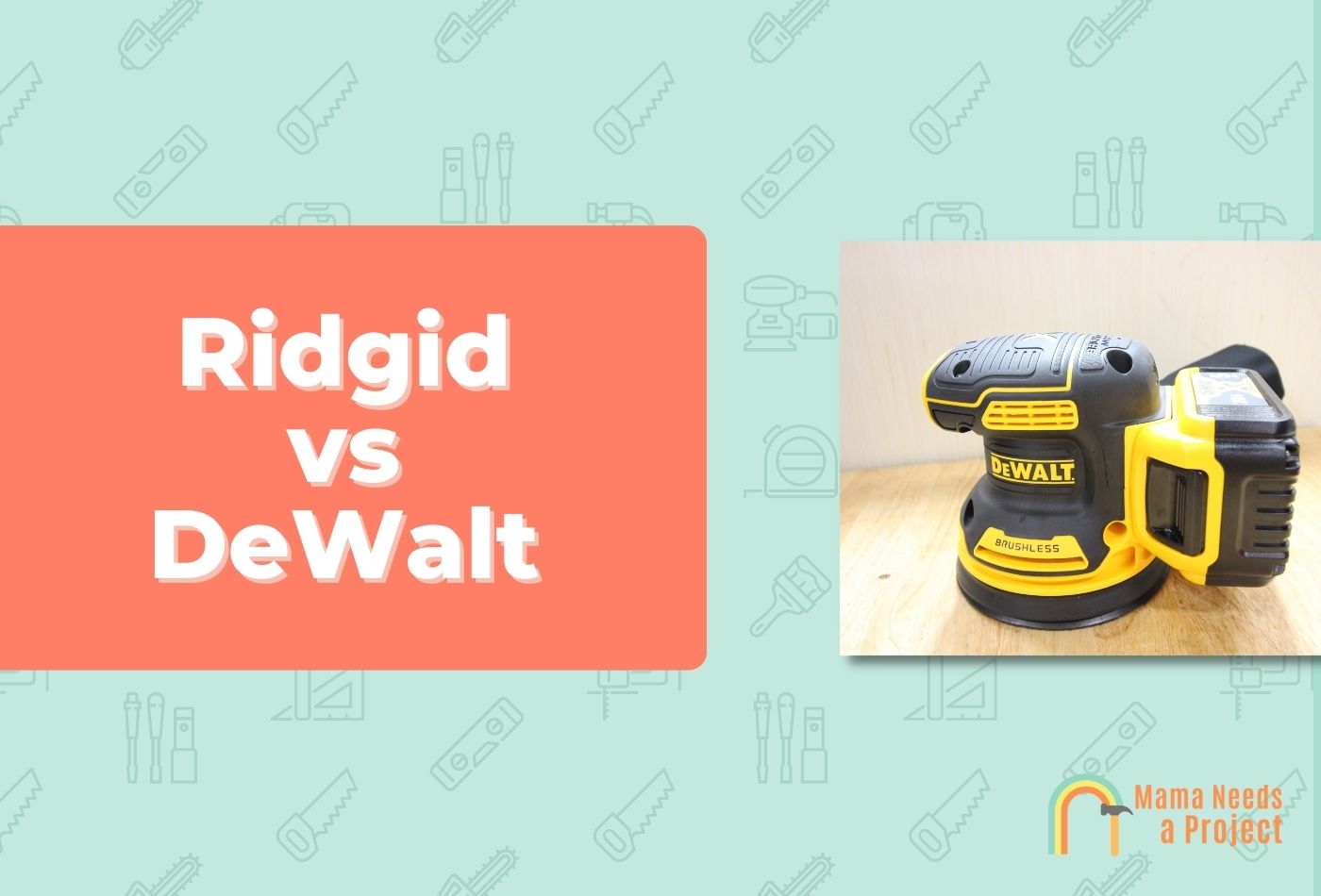Ridgid vs DeWalt Tools: Which is Better? (Ultimate Guide)
Most folks like to get attached to a particular tool brand and build their collections around it. This is especially true when considering cordless tools, as smart purchases often mean that DIYers and pros can use the same set of batteries for multiple tools.
Two of the power tool brands leading the way in the power tool industry are Ridgid and DeWalt, and both offer some great options.
In this guide, I’ll help you decide between Ridgid vs DeWalt so you can choose the right power tool brand for your needs. Let’s get started.
- Ultimately, DeWalt is a more reputable brand that produces some of the best tools on the market, but they come with a higher price tag than Ridgid tools.
- If you’re a professional and need the best of the best, DeWalt is the way to go.
- Ridgid tools are great for DIY projects, homeowners, and weekend warriors who are looking for solid tools at a more affordable price.
Ridgid vs DeWalt Power Tools
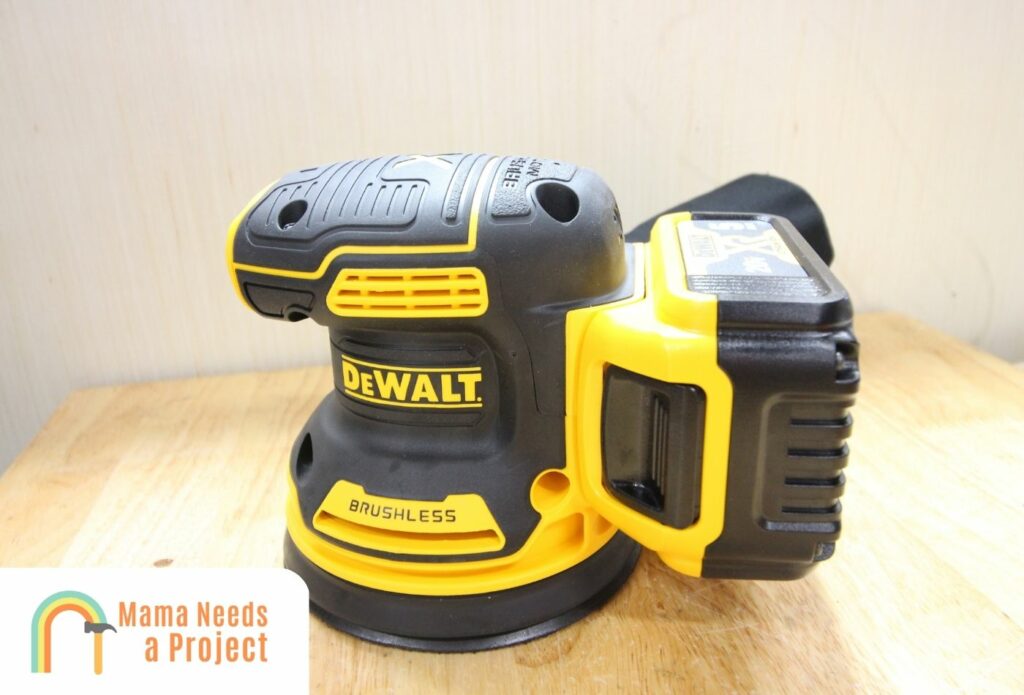
Before digging too deeply and providing a final ruling on which power tool brand is the best, it’s worth understanding what each brand has to offer. The following are some of the different aspects of each brand that one should consider.
Quality & Reliability
Both DeWalt and Ridgid are known to be high-quality tools. They use high-quality metals, polymers, motors, and other components, providing plenty of power and longevity. Choosing one over the other actually comes down to the type of tool.
When it comes to power tools, Dewalt is known for producing very high-quality tools for both DIYers and pros. This is true when considering the cordless lineup as well as the brand’s corded tools. When it comes to hand tools, DeWalt misses the mark a bit and usually doesn’t offer a ton of value.
Ridgid excels in its own areas too. For instance, Ridgid wet/dry vacs are durable, powerful, and of excellent quality. Also, its plumbing hand tools are the best in the business, but the standard DIY hand tools like hammers, tape measures, and other items are just on-par. Ridgid power tools are usually pretty good, and they often contain a lot of power.
Product Lineup
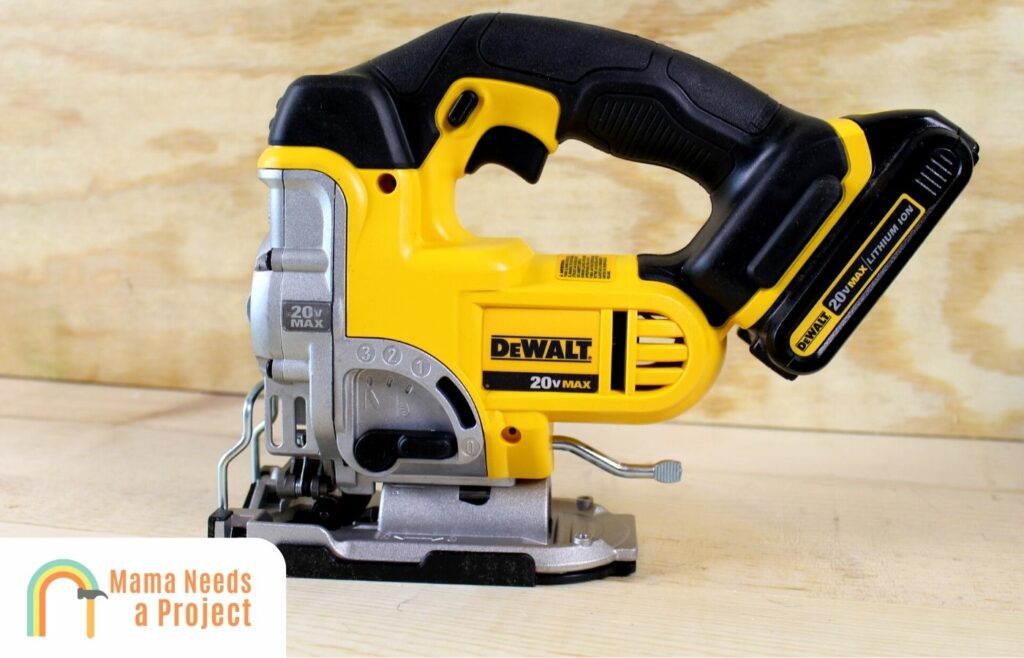
Both tools brands make a wide range of hand and power tools. For this comparison, I’ll focus mainly on power tools.
DeWalt’s power tool line-up is outstanding. The brand offers drills, impact drivers, circular saws, miter saws, table saws, planers, grinders, bandsaws, power snakes, and many other tools, both in battery-powered and corded options.
DeWalt really grabbed hold of the DIY, renovation, and pro markets during the 1990s when it first released its cordless tools, which are still widely regarded as the best on the market. The brand offers a wide range of battery sizes, with the most popular being the 20V Max lineup.
Ridgid’s stronghold has always been in the plumbing industry, first getting its start as a plumbing wrench manufacturer. It also started offering cordless plumbing fitting presses, which seems to have spurred the brand’s foray into cordless tool sets. Since then, the brand started offering drills, impact drivers, circular saws, reciprocating saws, oscillating tools, grinders, and much more. The brand has fewer battery options than DeWalt, but offers a competitive selection of tools.
Between the two brands, DeWalt just has more tools to offer. DeWalt typically has multiple sizes for each type of tool it offers and even works with heavy-duty outdoor power equipment, like chainsaws, lawnmowers, and string trimmers, among others.
Features
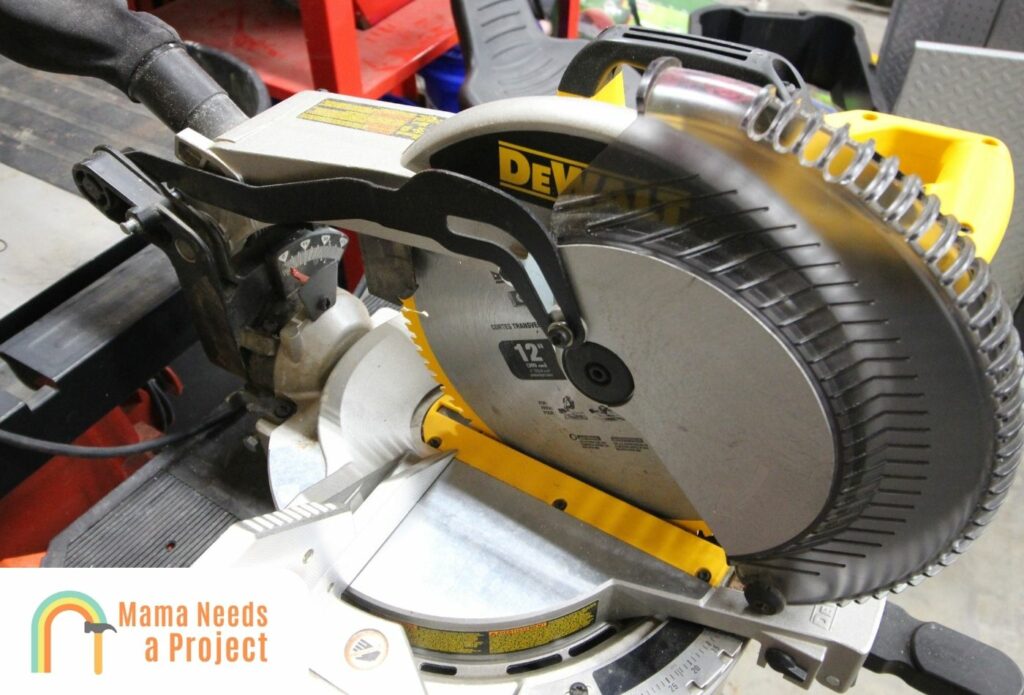
DeWalt tools are constantly loaded with the latest and greatest features. The brand produces FlexVolt batteries which can operate at 20 to 60 volts, depending on the tool they’re attached to. Also, many DeWalt tools feature brushless motors, which allows them to create more power with less battery consumption. Many tools even feature the brand’s Tool Connect Bluetooth technology, allowing users to track their tools’ locations on job sites.
Ridgid has some impressive features, as well. The brand is no stranger to powerful brushless motors and lithium-ion batteries with plenty of power. It also features Bluetooth tech in the form of Ridgid Link, which helps users track tools, as well. Battery technology isn’t quite as advanced as DeWalt’s, however. The brand mostly hangs its hat on the 18V Max Output battery lineup, which is an improvement over past generations’ underperformance and battery life.
Price
Ridgid and DeWalt’s pricing does vary a bit. Comparing the DeWalt 20V Max to the Ridgid 18V Max Output tools, as well as the corded tools, the pricing compares as follows (all prices accurate at Home Depot at the time of publishing):
Brushless Drill Driver/Impact Driver Combo with two batteries and bag:
Dewalt: $229
Ridgid: $169
7 ¼-inch Cordless Circular Saw, tool only:
Dewalt: $229.00
Ridgid: $199.99
12-inch Sliding Miter Saw, Double Bevel, 15-amp:
DeWalt: $399.00
Ridgid: $499.00
13-inch Thickness Planer, 15-amp:
DeWalt: $779.00
Ridgid: $499.00
10-inch Job Site Table Saw, 15-amp:
Dewalt: $649.00
Ridgid: $599.00
14- Gallon Shop Vac, 6 horsepower:
Dewalt: $208.61
Ridgid: $119.00
Clearly, DeWalt is quite a bit more expensive than Ridgid in most cases. It’s important to remember that DeWalt tools generally offer more features and technology than Ridgid tools do, which often accounts for the increase in price. Shoppers can save money on both brands by purchasing tool-only sets, which do not come with a battery.
Warranty
The warranties are one of the hottest topics between these two tool brands. Ridgid offers one of the best warranties and service agreements in the industry, while DeWalt helps customers avoid buyer’s remorse (and offers a pretty decent warranty, itself).
Dewalt offers three main warranties or guarantees.
The first warranty, which is the most popular and found on most tools purchased after January 1, 2004, is a three-year limited warranty, with 1-year free service contract, and a 90-day money-back guarantee. In that time, DeWalt will repair any defects free of charge, but only to the original purchases. It also offers a 7-year warranty on specially-marked products, which also includes a 1-year free service contract and a 90-day money-back guarantee. Finally, products that state they carry a 30-day money-back guarantee can be returned for a full refund within that window.
Ridgid’s warranties are even better.
Ridgid’s hand-held power tools carry a 3-year limited warranty during which customers can prevent the receipt and have the product or battery repaired or replaced. But, the Lifetime Service Agreement, if registered shortly after purchase, is available on stationary, battery-powered, pneumatic, and power equipment tools. Under this coverage, it protects the tool for as long as the original purchaser owns it.
Within the last two years, many of Ridgid’s customers faced challenges with the brand’s Octane batteries. Even though Ridgid no longer makes Octane batteries, limited service agreement holders were given replacement Max Output batteries. That can be a big deal for many shoppers.
History of Ridgid Tools
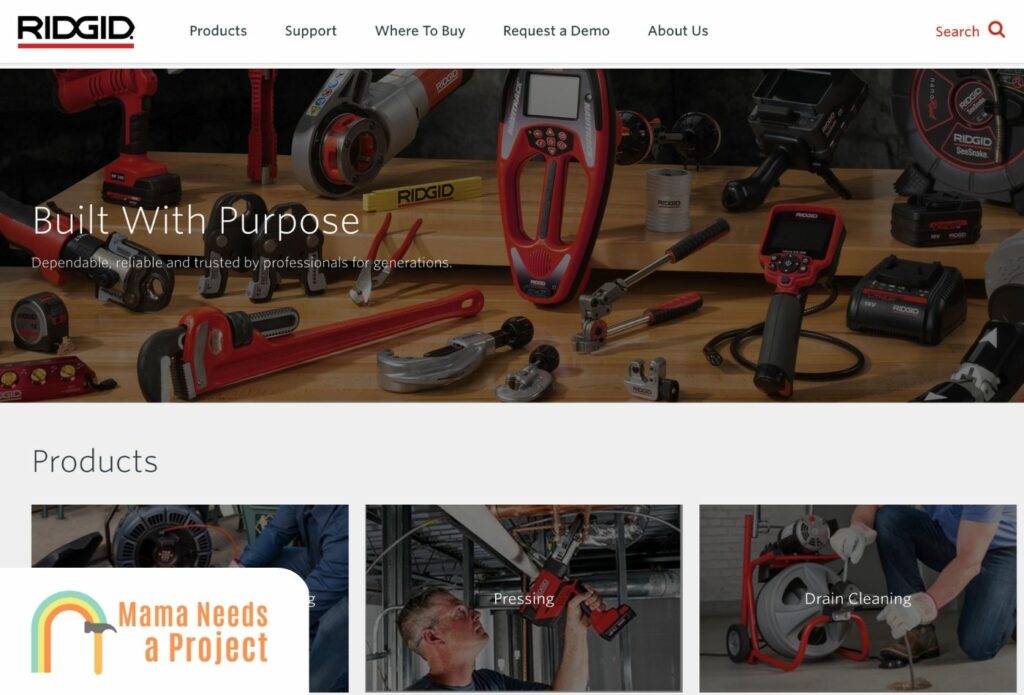
Ridgid Tools’ history reaches back 100 years ago to 1923. Started in Elyria, Ohio, the brand created the famous Ridgid Heavy-Duty Straight Pipe Wrench, which is still wildly popular and just as useful today.
Owned by Ridge Tool Company, the brand spent its first few decades creating plumbing hand tools and pipe threading machines, giving Ridgid a firm grip on not only plumbing pipes but also the plumbing tool industry.
In the 1960s, the brand would be purchased by Emerson Electric, but it would continue producing state-of-the-art plumbing tools for the next 30 years before making its first real splash into portable power tools with the CT-400 Pressing Tool. This tool was capable of making permanent connections between pipes and special fittings, doing away with the need for soldering or brazing.
Over time, Ridgid continued to expand its power tool line with drain cameras, portable pressing tools, and more. Eventually, the brand started producing power tools for construction and home improvement, developing a line of cordless drills, drivers, saws, and much more. With a relatively affordable price point on most of its tools, a Lifetime Service Agreement to die for, and a following of loyal Ridgid power tool faithful, it’s become a big player in the power tool industry.
Ridgid Pros
There are quite a few pros to Ridgid power tools. For one, the brand continues to sell its power tools at more affordable price points than its biggest competition. This means that you can build a tool collection for less money than some of the industry staples.
The other major benefit to purchasing Ridgid tools is the brand’s Lifetime Service Agreement warranty. If users register their tools right after purchase, the company will repair or replace the tools and batteries for the lifetime of the original ownership. So, if a battery fails due to manufacturer defects, Ridgid owners can send it back to Ridgid for a replacement. Considering how expensive batteries are to purchase, this is a significant benefit.
Ridgid Cons
The biggest cons facing Ridgid tools is the brand’s relative lack of innovation compared to competitors like DeWalt. Ridgid doesn’t have a flexible battery system yet, nor does it have a need for it based on the tool lineup.
And that could be Ridgid’s other drawback: There just aren’t as many Ridgid tools available, and they aren’t nearly as widespread as DeWalt’s. Almost every tool seller offers DeWalt tools, and a decent selection of them, while Ridgid’s availability is more limited. Shoppers won’t find Ridgid chainsaws, mowers, or string trimmers yet, putting the brand at a disadvantage to start.
History of DeWalt Tools
Like most great companies, DeWalt got its start after creating a revolutionary tool: the radial arm saw.
Started by Raymond E DeWalt in 1924 in Leola, Pennsylvania, DeWalt built its name by producing a woodworking tool that could quickly and accurately perform a wide variety of sawing functions, from cross-cutting to ripping and much more. The brand opened up state-of-the-art plants in Pennsylvania, allowing it to mass produce its coveted radial arm saw.
In the early 1940s, DeWalt saw significant growth through government contracts to manufacture machines during World War 2. It was then purchased by American Machine and Foundry Co in the late 40s, before it was sold to Stanley Black and Decker in 1960. Stanley Black and Decker still owns the brand, but sold the rights to the radial arm saw in the late 1980s. By the early 1990s, DeWalt’s focus was on producing compact, corded, and cordless power tools, the latter of which caught the love and admiration of the DIY and professional trades communities.
Today, DeWalt produces a wide range of power tools and hand tools, from drills, impact drivers, miter saws, and lawnmowers to tape measures, hammers, tool belts, and more. The brand has also been pushing battery technology forward, starting in the 1990s with nickel-cadmium technology and continuing today with Flexvolt 20/60V lithium-ion technology.
Wondering how DeWalt stacks up against other brands? Check out some of our other comparisons!
DeWalt Pros
The biggest benefit of DeWalt tools is their widespread availability. These tools are offered almost anywhere power tools are sold, making them a great choice to build a shop full of tools off of. The batteries are wildly interchangeable, even more so with the invention of Flexvolt technology. This means that users can buy tons of different tools that all run off the same battery system, eventually saving money since they can purchase tools without batteries.
Also, DeWalt’s other big plus is how it’s constantly pushing the boundaries of the latest technology. The brand was at the forefront of brushless motor technology in power tools, as well as nickel-cadmium and eventually lithium-ion battery tech.
DeWalt Cons
The biggest downside to DeWalt tools is that they are more expensive than many of the brand’s competitors (but not all!). However, the cost of introducing new technology and creating powerful, reliable tools does demand a bit of a premium, making these tools worth the investment, even if they are slightly more expensive than one might expect.
Ridgid vs DeWalt Verdict
Overall, I would choose DeWalt tools over Ridgid almost every time.
Sure, they are more expensive, but DeWalt’s dedication to technology and track record of producing quality cordless tools make us DeWalt-inclined.
I also like how many different types of tools DeWalt offers, from corded shop tools to cordless hand tools and even lawn mowers and string trimmers. Ridgid just doesn’t have that type of selection or technology. However, it’s still a quality brand with an excellent service agreement, so shoppers should still consider these power tools.
Final Thoughts
Ultimately, choosing between Ridgid vs DeWalt tools comes down to a few things.
Is technology important to you? And is building a stall full of tools around one battery line-up worth spending a little extra on the tools? If yes, then DeWalt is definitely the way to go.
Years of experience in the cordless tool industry and 100 years of manufacturing machinery make it the hands-down choice for most woodworkers, DIYers, and pros.

Tom Scalisi is a freelance writer, blogger, published author, and website owner with over 20 years of experience in the trades, DIY, and construction. Today, he’s mostly hung up his professional tool belt (though he’ll still tackle a DIY job every now and then) for writing, as he loves teaching DIYers how to accomplish their goals and get the job done.
Tom has written for some of the industry’s most popular websites, including Bob Vila, This Old House, The Family Handyman, and Forbes.
Outside of work and the internet, Tom is a husband and father of four. He loves baseball, whether it’s catching a game live or on TV, or coaching one of the many recreational or travel teams he’s with which he’s involved. He also serves as the Director of Baseball for his local baseball and softball league.

